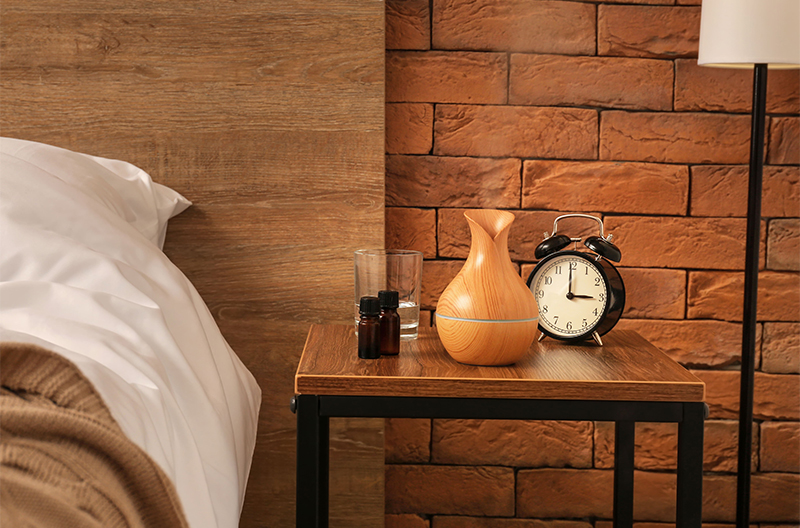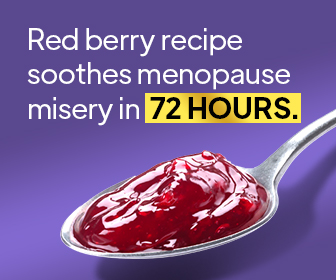Have you tried essential oils for sleep yet? There are many effective essential oils for ailments that target the causes of mild to moderate disruptive sleep,[1] as well as a few oils that have studies proving them helpful for sleep overall.
So, how can essential oils for sleep ensure you get a quality night of rest? Well, let’s take a look at the best oils that can help you get more quality “Zs” and the science behind their magic.
What Are Essential Oils for Sleep?
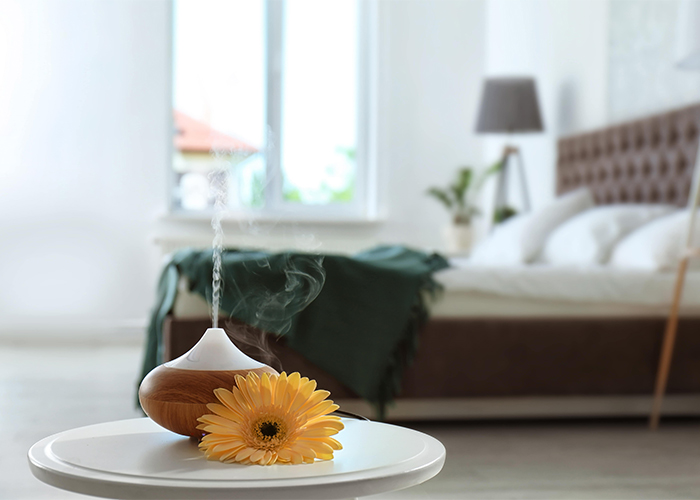
Let’s face it — falling asleep and staying asleep shouldn’t be that difficult. Yet, the American Sleep Association reports that between 50 and 70 million US adults have some form of sleep disorder. Of that group, insomnia is the most common.[2]
Even if you don’t have a clinical sleep problem, some nights are just harder to sleep than others. Factors like stress, anxiety, and depression play a big part in that.
So, what exactly are essential oils for sleep? In short, these are just plant-based, all-natural oils that can be used as an aromatherapy tool to help you get to sleep, and stay asleep, a lot easier.
You can use a diffuser to inhale as you lie in bed, or drop a blend of a few oils into your pillow mist and get their benefits that way.
Some oils, such as peppermint, are even beneficial to relax and keep your airways open at night too,[3] helping to ease symptoms of snoring.
Plus, one thing these oils all have in common is that they smell great. So you’ll get to sleep easier while being surrounded by some of nature’s most aromatic smells, such as lavender and sandalwood. Mmm!
Do They Really Work?
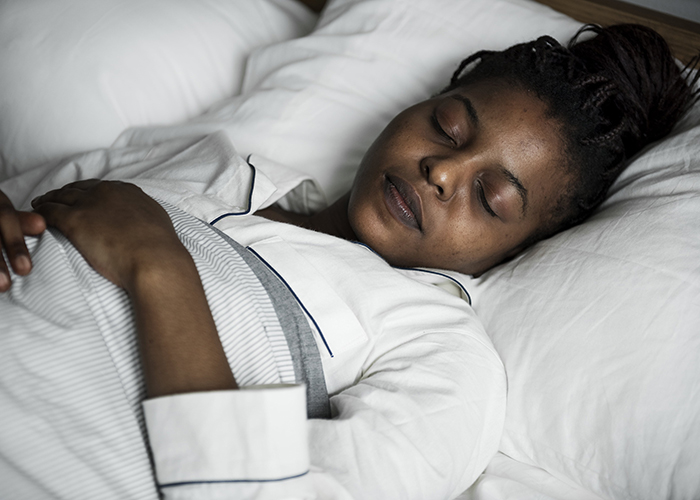
It might seem too good to be true, right? That just by smelling some oils, you can potentially get to sleep faster and sleep more deeply. However, there are some studies to back up the hype of these soothing scents. For example, one study showed that essential oils for sleep can improve both the quality of slumber in women along with their quality of life.[4]
Basically, essential oils work by entering your olfactory system and then they signal other parts of your brain, like your central nervous system, your memories, your hormones, and more. They can help reduce stress, anxiety, depression, and mildly sedate you so you’ll feel sleepier.
The best essential oils for sleep are listed below. You can’t lose much by giving them a try — and, if they’re a good fit, you can ultimately gain a healthier, more well-rested you!
The 6 Best Essential Oils to Help Sleep
1. Chamomile
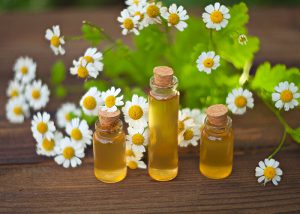
According to scientists, chamomile has a long history as a mild tranquilizer and sleep-inducer.[5] It’s thought to work so well because of a special flavonoid that affects receptors in your brain.[6]
Furthermore, it’s also one of the best calming essential oils for anxiety and depression.[7] One study that tracked the cardiac effects of chamomile showed that 10 of the 12 participants fell asleep shortly after drinking chamomile tea.[8] While further research on the essential oil is needed, it’s commonly accepted as a more potent form of the herbal plant, and yields similar benefits.
2. Lavender
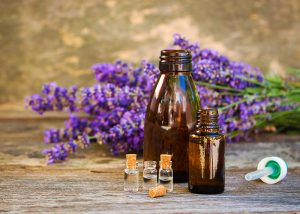
Lavender can act as an anti-anxiety tool and mild analgesic (pain reducer) to help calm your mind and prepare it for rest.[9]
In one study, lavender aromatherapy was administered to women with insomnia. Researchers discovered the lavender therapy helped improve quality of sleep in the tested women for the duration of their treatment.[10]
Another study with lavender proved it helped postpartum women sleep better too.[11]
3. Bergamot

Bergamot is one of the more well-known essential oils for depression. It’s particularly effective as a mild antidepressant and has shown to be beneficial for general mental ailments.[12] Therefore, it can help improve your sleep by reducing your stress levels and improving your overall mood.[13]
In one bergamot summary of studies, this essential oil was noted for its abilities to reduce your heart rate, blood pressure, and stress response.[14]
4. Jasmine
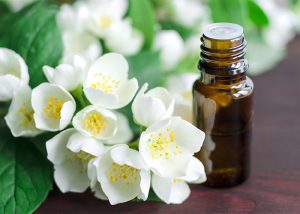
Jasmine essential oil is widely-researched in the sleep realm. It’s repeatedly referred to as a sleep aid because of its ability to affect brain wave activity and positively change your mood.[15]
This oil, as with many of the other essential oils for sleep, can relieve mild anxiety and help you feel more relaxed.[16]
Lastly, jasmine can not only help you get to sleep, but it can also increase the duration of your sleep as well.[17] So, on your days off, when you have the opportunity to sleep in a bit more, add some jasmine into your nightly routine.
5. Sandalwood
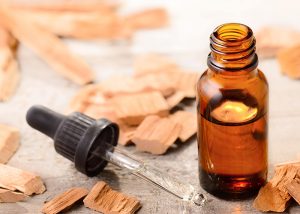
Sandalwood essential oil is rich in santalol,[18] which can have a mild sedative effect. One study tracked a blend of essential oils, including sandalwood, focusing on participants with perennial allergic rhinitis. Their chronic allergic condition, which causes congestion and a runny nose, inhibited the patients from getting a good night’s sleep. The study found that the participants inhaling the aromatherapy blend actually alleviated some of their symptoms, which resulted in improved sleep and reduced fatigue.[19]
Therefore, sandalwood may also be one of the most useful essential oils for allergies during springtime.
6. Valerian
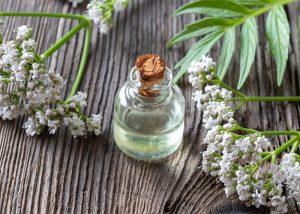
While not the most well-known essential oil on the American market, valerian shouldn’t be left out. Valerian root has been working to help improve sleep in Europe for decades.[20]
In fact, according to The National Sleep Foundation, valerian is one of the best scientifically-proven essential oils that can promote sleep.[21] One study using rats showed that valerian oil may enhance sleep quality as well.[22] In other words, it can potentially work to not only get you to sleep, but make your sleep sessions overall more rejuvenating!
Remember: In the same study promoting the valerian essential oil’s impact on sleep support, lemon was shown to actually increase insomnia symptoms. So, if you want to sleep deeper, don’t reach for lemon!
How to Use Essential Oils for Sleep
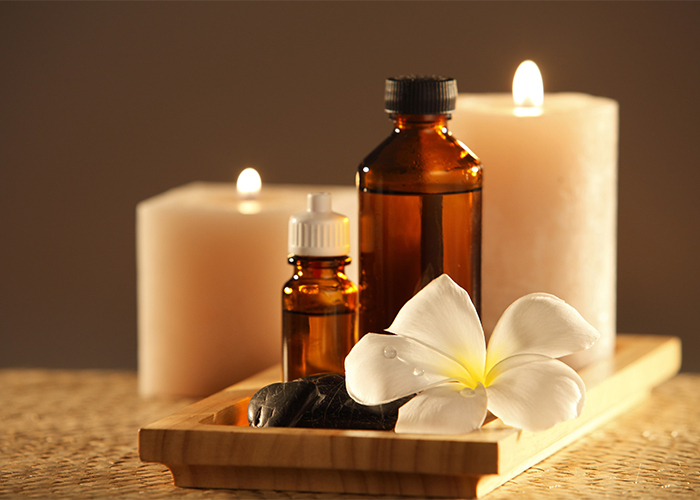
- Diffuse the oils in water according to your diffuser’s directions.
- Add an oil blend into your nightly lotion and smell it on your skin as you drift to sleep.
- Combine water and your favorite essential oil for sleep in a spray bottle and mist your pillows and sheets before bed.
- Hold an oil bottle close to your nose and inhale deeply for a few minutes before bed, preferably while meditating.
- Make a homemade essential oil candle and burn it while you do your nightly routine in your bedroom or bathroom. Just be sure to extinguish it before actually sleeping!
- Drop some essential oils onto your robe collar for an easy aromatherapy on-the-go while you tuck the kids into bed.
Essential Oil Recipes for Sleep You Can Make at Home
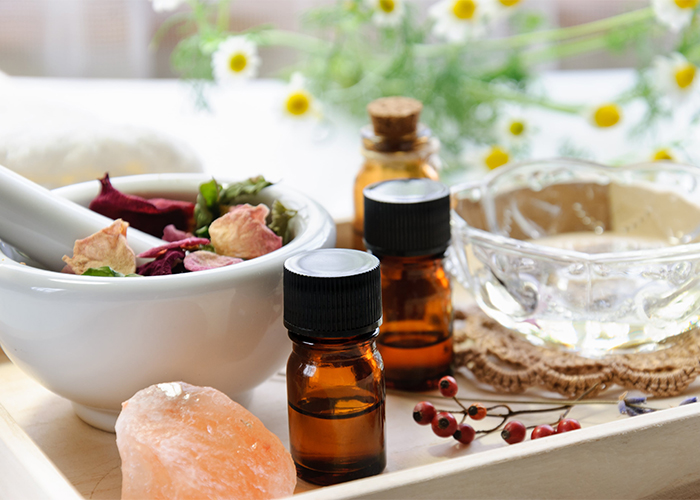
You can buy essential oils already ready for use, or try making a variation of them at home as a fun and easy weekend project. With homemade oils, you’ll feel confident by knowing exactly what went into them — no added chemicals or substitutes!
To make authentic essential oils, you’ll need to have distilling equipment, which can be pretty expensive. So, as a common variation, let’s learn how to make an infused oil extract. This oil can be used just like essential oils except you’ll want to use more drops each use, as the final product won’t be quite as potent.
Here’s a quick how-to recipe for making lavender oil extract at home:
Lavender Oil Extract
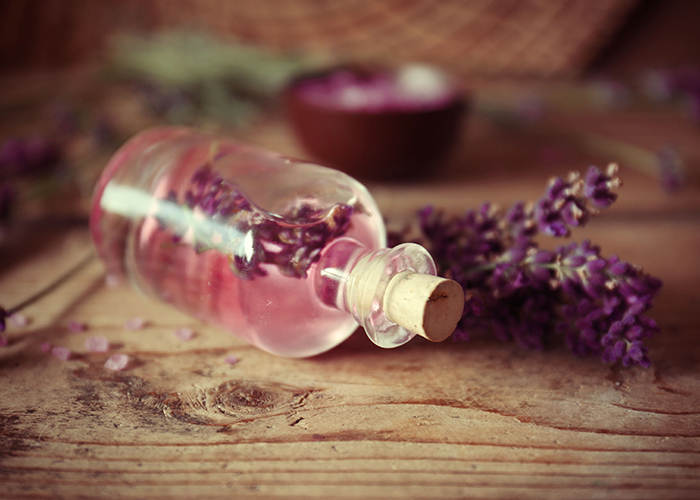
Prep Time: 5 mins | Total Time: 2 weeks | Serving Size: about 7 oz of lavender oil
Equipment: Spoon, 2 large mason jars (32 oz) with lids, 3 coffee filters, a bowl, and tinted storing jar
Ingredients
- Two mason jars full of fresh lavender buds
- 32 oz vodka
Instructions
- To prepare, put your lavender buds into the bowl and press with the back of a spoon. This bruises the buds a bit and helps them to release more oils. Don’t crush them totally — just enough to get the buds a little ruffled up.
- Next, fill up 1 mason jar with lavender buds and pour in the vodka. Remember to make sure that the vodka covers the lavender completely. Close tightly with the mason jar lid.
- For the next 3 days, shake the jar around for a few minutes when you can, as this will help release more oils. You may start to notice the buds losing some of their color.
- After 2 more days, prepare a new mason jar with fresh buds again. Then, open the first mason jar full of now lavender-infused vodka, and use a coffee filter to strain out the vodka into the new jar. Close the lid tightly on the jar with the new lavender buds and infused vodka. You can throw away the old lavender buds.
- Repeat the shaking process for another 3 days. In the meantime, wash your previously used mason jar because you’ll need it again in step six.
- Now, open your lavender and vodka jar, and use another coffee filter to strain the liquid into a fresh, empty mason jar. Secure a clean coffee filter on top of the opening and leave to sit (don’t shake this time) for 1 week. The vodka will start to evaporate and the oils will be left in the end.
- You can store the finished product in a tinted, dark-colored glass jar away from direct sunlight. For some recipes to use this extract in, keep reading!
Now that you’ve made some of your own homemade essential oils, here are a few easy essential oil recipes for sleep. You can make these all on your own with household items.
Tip: You can substitute the lavender in this recipe for any of your favorite sleep-inducing herbs!
Magic Massage Oil
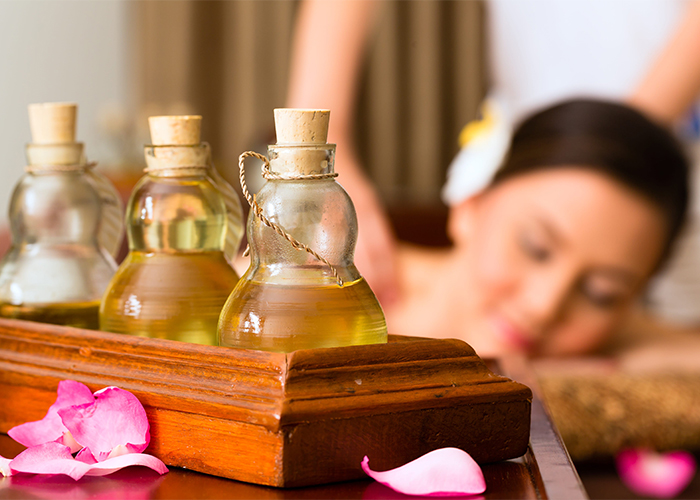
Prep Time: 5 mins | Equipment: 4 oz glass jar with lid
Ingredients
- 4 oz of a carrier oil (almond oil, coconut oil, rosehip oil)
- 10 drops of homemade lavender oil
- 5 drops of store-bought sandalwood essential oil
Instructions
- Put the carrier oil of your choice into the jar. If you’re using coconut oil, make sure it’s in a liquid state before proceeding.
- Add in the lavender and sandalwood oils. Then, close the lid tightly and shake to combine! Rub this onto your skin and enjoy the moisturizing and calming effects of this evening self-care massage. Bonus points if you share with your partner!
Diffusion Aromatherapy Angel
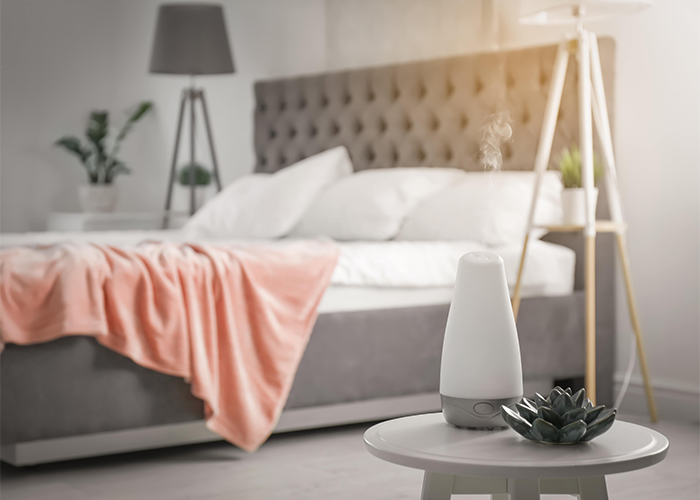
Prep Time: 5 mins | Equipment: Essential oil diffuser machine
Ingredients (for specific amounts, check the directions on your diffuser machine)
- Water
- Jasmine oil
- Vanilla oil
Instructions
- Add some water into your diffuser before bedtime. Drop the jasmine and vanilla essential oils into the water as well.
- Make sure your device has a self-timer or automatic shut off so you can sleep without needing to restock the water. This comforting scent will waft through the air just like your favorite candle on a winter day. It’s perfect when you want to read a book in bed and gently slip into sleep.
Fun and Floral Room Mist
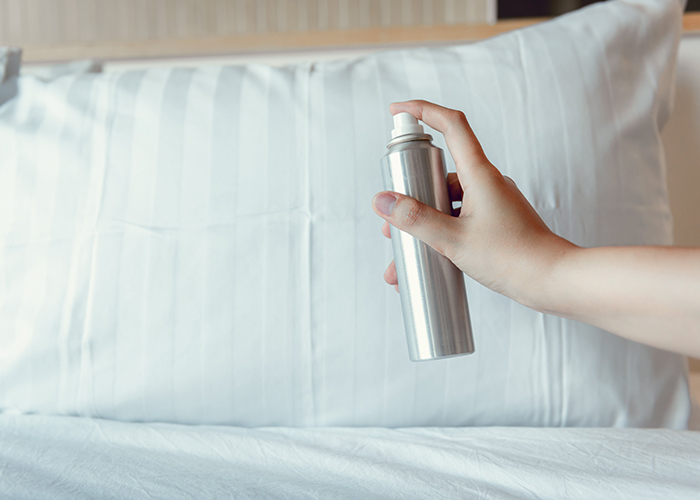
Prep Time: 5 mins | Equipment: Spray bottle 5 oz
Ingredients
- 5 oz of water
- 6 drops of homemade rose oil
- 4 drops of homemade geranium oil
Instructions
- Combine 5 oz of water with the rose oil and geranium oil. Close the lid and shake to combine.
- Spritz around your room before you climb into bed. This mist can be sprayed all over your house and even on yourself! If you want to substitute some rose water in place of regular water, that would be great too.
Note: When using homemade essential oils to help sleep, you’ll want to use a few more drops than usual. Store-bought products are typically more potent than what you can make on your own.
Sleep Well!
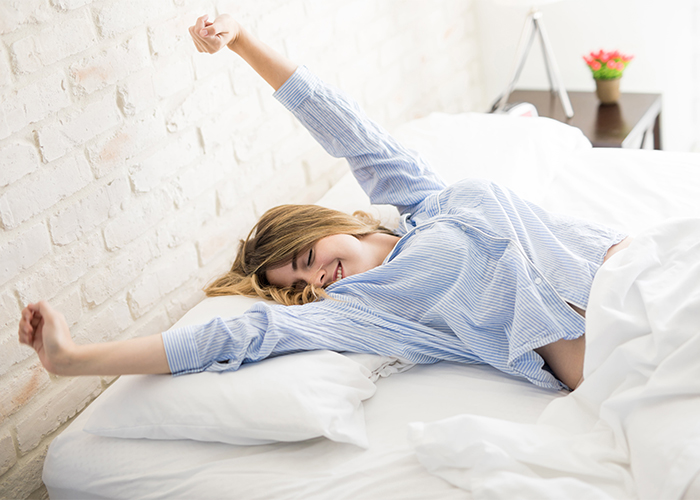
Don’t go another sleepless night. Essential oils to help sleep are an amazing, natural way to catch more nighttime Zs and, therefore, get the most of your days.
Find the combination of essential oils that works best for you, and try using them with your bedtime routine. It’s a small added step that can work wonders for your overall health and wellness. Sweet dreams!
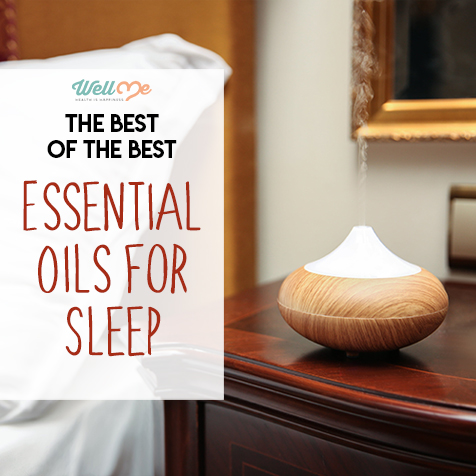
References
- [1] https://www.ncbi.nlm.nih.gov/pubmed/24720812
- [2] https://www.sleepassociation.org/about-sleep/sleep-statistics/
- [3] https://www.ncbi.nlm.nih.gov/pmc/articles/PMC4103722/
- [4] https://www.ncbi.nlm.nih.gov/pubmed/28504569/
- [5] https://www.ncbi.nlm.nih.gov/pmc/articles/PMC2995283/#targetText=Chamomile%20is%20widely%20regarded%20as,and%20CNS%20depressant%20effects%20respectively.
- [6] https://www.ncbi.nlm.nih.gov/pmc/articles/PMC2995283/#targetText=Chamomile%20is%20widely%20regarded%20as,and%20CNS%20depressant%20effects%20respectively.
- [7] https://www.ncbi.nlm.nih.gov/pmc/articles/PMC2995283/#targetText=Chamomile%20is%20widely%20regarded%20as,and%20CNS%20depressant%20effects%20respectively.
- [8] https://www.ncbi.nlm.nih.gov/pmc/articles/PMC2995283/#targetText=Chamomile%20is%20widely%20regarded%20as,and%20CNS%20depressant%20effects%20respectively.
- [9] https://www.ncbi.nlm.nih.gov/pmc/articles/PMC3612440/#targetText=Oral%20lavender%20oil%20preparation%20(80,)%20anxiety%20disorder%20%5B52%5D.
- [10] https://www.hindawi.com/journals/ecam/2012/740813/abs/
- [11] https://www.ncbi.nlm.nih.gov/pmc/articles/PMC4443384/
- [12] https://www.ncbi.nlm.nih.gov/pmc/articles/PMC5434918/
- [13] https://www.ncbi.nlm.nih.gov/pmc/articles/PMC4345801/#targetText=Bergamot%20essential%20oil%20is%20widely,induction%20(Wiebe%2C%202000).
- [14] https://www.ncbi.nlm.nih.gov/pmc/articles/PMC4345801/#targetText=Bergamot%20essential%20oil%20is%20widely,induction%20(Wiebe%2C%202000).
- [15] https://www.researchgate.net/publication/321431103_EFFECTIVENESS_OF_AROMATHERAPY_IN_INSOMNIA
- [16] https://www.researchgate.net/publication/321431103_EFFECTIVENESS_OF_AROMATHERAPY_IN_INSOMNIA
- [17] https://www.researchgate.net/publication/321431103_EFFECTIVENESS_OF_AROMATHERAPY_IN_INSOMNIA
- [18] https://www.ncbi.nlm.nih.gov/pmc/articles/PMC4808543/
- [19] https://www.ncbi.nlm.nih.gov/pmc/articles/PMC4808543/
- [20] https://www.ncbi.nlm.nih.gov/pmc/articles/PMC4394901/
- [21] https://www.sleep.org/articles/best-essential-oils-good-nights-sleep/
- [22] https://academic.oup.com/chemse/article/31/8/731/363897

